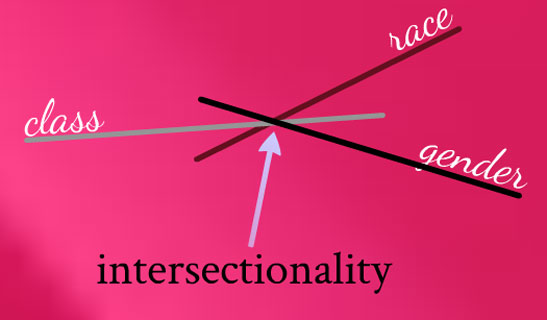How oppression contributes to systematic injustice and social inequality
Oftentimes, we disregard issues if we don’t believe that they directly impact us. Inner city schools have poor funding? Who cares, I went to private school. The unemployment rate keeps rising? Oh well, I’ve got a job. Gay people want to get married? Not my problem, I’m straight. Women don’t get the same pay rate as men? Guess I’m lucky I’m a guy then. What this mentality leaves us with is a group of individuals who fend for themselves, and neglect the notion that just because an issue doesn’t affect them personally, doesn’t mean it isn’t an issue.
In steps this idea of intersectionality, a mentality that brings together all people with the conclusion that forms of oppression are all interwoven within our institutions. Since we are not “either/or” beings we cannot function under and “either/or” mentality of oppression. A black lesbian woman in a wheelchair has to deal with the intersection of racism, sexism, ableism, and homophobia. These forms of oppression are simultaneously forced upon her within our society. Another component of intersectionality is that you cannot fight one form of oppression while letting the others stand. So, for instance, by fighting homophobia, you are simultaneously fighting the oppression on women.
“Woah,” you may be thinking, “How in the world does some jerk calling a gay guy a ‘fag’ have anything to do with a woman getting sexually assaulted?” Well, directly point A to point B…nothing, but it is an enabling condition. When gay men get called “fag,” “pussy,” “pansy,” or “sissy,” what the bigots are really getting at is that they are less than men, that they are figuratively women. Within our society, to be called in such a way is offensive because we see women as being lesser than men. The supposed superiority of men then gives credence to the idea that men should be able to do what they want, when they want, to whomever they want. A woman, then, being the lesser human, does not need the rights to her own body, she is merely regulated to being a prop for men’s pleasure. This prop, then, does not have the right to say “no”—and when she does, it can be ignored.
The same argument can be used when describing the negative mentality and words used to describe lesbians. Words such as “dyke” or “butch”—even simply being called a “lesbian”—creates an environment meant to promote the heterosexual male. Seemingly, because women who are attracted to other women don’t need men in their lives, they are automatically upsetting the status quo. They’re putting the idea of what it means to be a man with masculinity topsy turvy, and within our society that must be punished. I know more than quite a few women who have found that once their sexuality is disclosed they are encountered with, “You just need a good lay,” or “You just haven’t found a real man yet.” It’s as if you cannot be validated as a woman, much less as a person, unless you are with a man. Any woman who is seen as confident, independent, and strong can be labeled a lesbian, not because of her actual sexuality, but because she cannot have those characteristics and still be woman. Therefore, she still must be seen as less.
The common factor between these two arguments is that any deviance from the heteronormative ideal (read: if a woman is too manly or a man is not manly enough) inherently makes you lesser. This dynamic makes it so that either way you can’t win. However, if we can realize that these two issues, and many others, are connected, then not only can we better understand the root causes, but we can construct an attack against bigotry in all its forms. We tend to forget that just fighting for “gay rights” or “women’s rights” limits us from fighting oppression as a whole. There are lesbian women and straight women allies, could you look them in the face and tell them that their issues aren’t nearly as important as yours? That your suffering is worse than theirs and yours should be supported more? Indifference to humanity is the enemy of progress, and a hindrance to achieving intersectional justice for all. Embedded in that notion is the justification for why we should be fighting for human rights regardless of race, class, religion, gender, sexual orientation, or ability. I know I am a blend of attributes, each with its own piece of oppression worthy of a fight. In standing up to one injustice, I’m fighting them all.
 Katrina Miles is a senior at James Madison University majoring in Sociology and Communication Studies with a minor in Women and Gender Studies.
Katrina Miles is a senior at James Madison University majoring in Sociology and Communication Studies with a minor in Women and Gender Studies.


